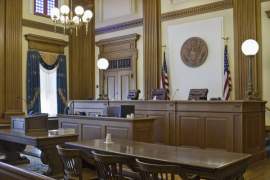
Hearings At A Glance

In the legal system, a hearing is a proceeding before a decision-making body, such as a Government agency or a court. Hearings are typically distinguished from a trial because they are usually shorter and less formal. In the court of general litigation, hearings are administered as oral arguments in support of evidence or various motions.
A hearing is initiated to settle a dispute and to avoid further time-consuming and costly maneuvers associated with a trial. The intended goal of those participating in a hearing is to achieve a motion to dismiss or for a summary judgment.
A motion to dismiss is a procedural maneuver to settle a contested issue before a court. A motion, in essence, is a request to the judge to resolve the case in question. In contrast, a summary judgment is a determination offered by a court without the inclusion of a full trial in the legal process. Limited testimony may also be presented in hearings to supersede the legal arguments.
In the United States legal system, hearings went through a revolutionary transformation that was driven by the advent of due process. The evolution was sparked through the Supreme Court ruling that former administrative decisions that were enshrouded in informality are now mandated to be preceded by a hearing. This ruling constitutes that a "hearing" is dependent on the context and the complexity of the case in question.
To simplify, hearings resemble a trial in that they are held publicly and involve opposing parties, but they differ in that they feature a more informal or relaxed standard of evidence and procedure. Hearings also take place in a variety of settings and fall into three categories: judicial, administrative, and legislative. A judicial hearing is tailored to target the issue at hand, an administrative hearing covers matters of rule associated with the individual cases, and legislative hearings are administered to evaluate facts and survey public opinion.



















